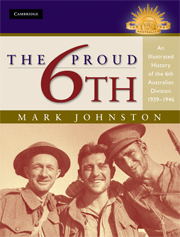Book contents
- Frontmatter
- Epigraph
- Contents
- List of Maps
- Acknowledgements
- Conventions and Abbreviations
- Introduction
- 1 Origins and Early Days
- 2 Bardia
- 3 Tobruk to Benghazi
- 4 Greece
- 5 Crete
- 6 Syria
- 7 Return to Australia
- 8 Kokoda to the Sea
- 9 Wau-Salamaua
- 10 The Longest Wait: Australia 1943–4
- 11 Aitape–Wewak
- 12 Conclusion
- Appendix 1 6th Division Casualties
- Appendix 2 6th Division Honours and Awards
- Notes
- Bibliography
- Index
12 - Conclusion
Published online by Cambridge University Press: 05 February 2015
- Frontmatter
- Epigraph
- Contents
- List of Maps
- Acknowledgements
- Conventions and Abbreviations
- Introduction
- 1 Origins and Early Days
- 2 Bardia
- 3 Tobruk to Benghazi
- 4 Greece
- 5 Crete
- 6 Syria
- 7 Return to Australia
- 8 Kokoda to the Sea
- 9 Wau-Salamaua
- 10 The Longest Wait: Australia 1943–4
- 11 Aitape–Wewak
- 12 Conclusion
- Appendix 1 6th Division Casualties
- Appendix 2 6th Division Honours and Awards
- Notes
- Bibliography
- Index
Summary
When the news of the Japanese government's surrender offer reached the 2/6th Battalion, part of the unit was still in contact with the enemy. The battalion war diary said the news ‘aroused very great interest’, while the acting CO wrote of ‘much joy about the camp’. However, on 16 August an angry sergeant in the battalion wrote bitterly about what he considered the ‘sickening riotousness and frivolity with which Australia is celebrating the end of the war’. He felt such frivolity was unjustified until the ‘treacherous’ Japanese laid down their arms – something that did not seem likely where he was. He could hear firing and he knew that Australians were being hit.
Perhaps more depressing for the sergeant was his conviction that, once the tumult died down and the Australians returned home: ‘We will not be welcome – not sincerely anyhow. We return to claim the fair deal for which we have been fighting so long. The rotten animals who stayed at home . . . will do their damndest to see we don't get it’.
How typical were such feelings? An officer in the 2/4th Battalion virtually replicated these sentiments in a letter home. He wrote that in his unit there was ‘much sarcastic talk about the peace celebration’.
The sergeant's misapprehension about civilian life seems more extreme than most, but the lieutenant also said: ‘Few expect to get any help in their future life from the Government, and in fact Australia stands pretty low in their estimation’. Soldiers’ letters during and after the campaign reflected annoyance, suspicion and contempt for Australian politicians. The troops were angry at shortages of supplies and reinforcements and then, in the campaign's aftermath, cynical and frustrated by the delays involved in getting them home.
- Type
- Chapter
- Information
- The Proud 6thAn Illustrated History of the 6th Australian Division 1939–1946, pp. 233 - 240Publisher: Cambridge University PressPrint publication year: 2008



